Chinese researchers say they have developed artificial intelligence (AI) that can monitor the development of mouse embryos as they grow in an artificial womb in real time. The system measures key indicators such as carbon dioxide or nutrient levels and adjusts them accordingly for optimized growth. Could humans ever be born the same way?
An incubator capable of mimicking the physiology of a uterus in order to offer better chances of healthy survival to very premature babies:this is the objective pursued by many researchers around the world. In 2017, a team led by Alan Flake of Children's Hospital Philadelphia took a significant step in this direction by allowing lamb fetuses to develop for a month in a transparent plastic bag connected to various blood circuits. and physiological, apparently without sequelae.
In addition to saving babies born before 24 weeks , artificial wombs could also allow women to give birth without the trauma of childbirth . These can be physical (muscle tears, incontinence, organic damage or fractures of the bones of the pelvis) or psychological. These include problems with post-traumatic stress and depression.
Of course, such a future would inevitably come up against many ethical concerns, but the demand is growing and the need very real. In China, some researchers have understood this.

In 2019, two separate research teams succeeded in culturing primate embryos for up to twenty days, thus reigniting the debate on the fourteen-day limit currently in force at the level international for experimentation on human embryos.
More recently, researchers at the Suzhou Institute of Biomedical Engineering and Technology have developed an AI capable of monitoring embryos as they transform fetus, and adjust key parameters in real time to ensure optimal growth. The artificial uterus would thus have successfully grown several mouse embryos inside cube-shaped enclosures filled with all the nutritious fluids they need to develop.
Furthermore, the system would be able to take ultra-sharp images of varying depth during key development moments. This type of monitoring could therefore reveal to us crucial information on the very first stages of maturity of the human embryo . The device "will not only help to better understand the origin of life and embryonic development of humans, but also provide a theoretical basis for solving birth defects and other major reproductive health problems “, note the researchers. However, as stated above, international laws prohibit studies on human embryos beyond two weeks of development.
Their work is published in the Journal of Biomedical Engineering.